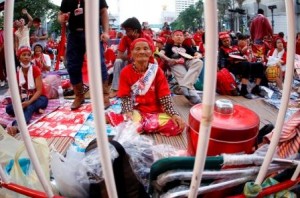What Now for Thailand?
By experts and staff
- Published
Experts
![]() By Joshua KurlantzickSenior Fellow for Southeast Asia and South Asia
By Joshua KurlantzickSenior Fellow for Southeast Asia and South Asia

The standoff in Bangkok looks like it will come to a head dangerously soon. Thai Prime Minister Abhisit Vejjajiva has tasked the commander in chief of the armed forces to take control of the situation, probably because he wants to prod the commander, now essentially the fall guy, to move faster. Neither side seems ready to budge: The red shirt protestors remain camped out in the center of the financial/shopping district, and the security forces are moving closer to them. King Bhumibhol has not made any move to intervene.
Some Thais believe that this is because the respected monarch is very sick, which he is. But the decision by this politically savvy monarch may be just as much because Bhumibhol has realized that this time, unlike in the past, Thais will not listen to him if he intervenes, and so he does not want to threaten his credibility by taking a stance. After all, the red shirts feel so increasingly alienated from the monarchy, because of its role in supporting the government of Abhisit, that it is likely that a royal intervention would not make much difference to them. The fact that Queen Sirikit and Thailand’s crown prince publicly attended the funeral rites of one of the military officers killed in the street violence on April 10 only further suggests to the protestors that the monarchy is not the impartial actor it portrays itself as. Worst, neither the monarchy nor other elites in Bangkok seem to have realized, as the well-known blogger Bangkok Pundit notes, the rural masses are no longer as uneducated and complacent as in the past – they have gained such a sense of empowerment, through greater rural education and political federalism, that they will never be talked down to again.
Still, Abhisit’s government cannot let the red shirt demonstration go on. It paralyzes traffic and commerce, it makes the prime minister look extremely weak, and it is destroying Thailand’s vital tourism industry. Bangkokians are right to insist on some degree of order in their city, which is increasingly turning into a realm of lawlessness. And it is certainly reasonable for the government to arrest red shirt leaders who have committed or planned violent acts.
The trouble is, any crackdown on the red shirts risks looking like a double standard, since the security forces did almost nothing against elite yellow shirt protestors (including now-foreign minister Kasit Piromya) who, in 2008, launched a similar takeover of Bangkok’s main international airport, causing similar chaos and damage to the Thai economy. If Abhisit does crack down, the red shirts will legitimately question why this double standard exists. If he doesn’t, he will lose his Bangkok support base and probably the loyalty of many junior army officers, who are furious at the red shirts and want to make a move. Ultimately, the most plausible – and unfortunately, dangerous- scenario is that Abhisit will authorize a real crackdown by the security forces, but will step back from direct control of the operation, to give himself some deniability if it goes wrong. And that could lead to violence that will make April 10 look like nothing.
